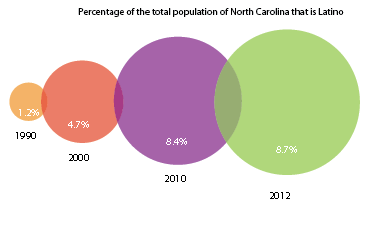N.C. State Spanish professors Ana Gray and Cheryl Block, along with author Patricia Willoughby, created a program called ProSalud in the spring of 2013, as a means of helping health-care professionals effectively communicate with Spanish-speaking patients. The program consists of translation services, an online Spanish course and an online certificate.
According to the creators of ProSalud, the growth of the Hispanic population in this state, and in this country, is not slowing down.
“It’s the number one minority,” Gray said. “Spanish is the second-most spoken language in the United States.”
According to the U.S. Census Bureau, the estimated population indicates, as of 2011, there were “roughly 52 million Hispanics living in the United States, representing approximately 16.7 percent of the U.S. total population, making people of Hispanic origin the nation’s largest ethnic or race minority.”
Spanish for Health Professions, FLS 201-603, is a 3-credit online course offered through DELTA. Because ProSalud is an online program, it is not only available for students at N.C. State, but it is accessible to students in the UNC- System and even to students around the world.
“We can reach a broader audience in North Carolina, in the United States, and in the world,” Gray said. “ProSalud has a certificate online that students can take right after they finish FLS 201 or people in general who already have a background but need to strengthen their resume and interview without waiting until they complete the minor or the major in Spanish, which could take several semesters.”
The grammatical structures are the same in FLS 201-603 as they are in every other 201 class, according to Block. However, this course is geared toward students following the medical path. The textbook for the class, written by Gray, Block and Willoughby, has chapters, topics and vocabulary catered to the medical field.
“The chapters were chosen by things that come up in the Latino community: diabetes is a large health issue, heart conditions of different kinds could be a large health issue, and then of course everything else like infectious illnesses and injuries,” Block said. “The vocabulary is chosen along those lines too. So for example, there’s an entire vocabulary section on just legal terminology; there’s another vocabulary section for different injuries and also terminology for rescue equipment.”
According to Gray and Block, the FLS 201 medical course presents a service-learning opportunities.
“In this class, there is an element of service learning, because we agree that’s a very important aspect,” Block said. “We require in this 201 class that students either do 3 hours of interpretation at a health care clinic hospital or that they interview someone in Spanish who works very closely with the Latino community in the health sector.
“One reason [Spanish] is so crucial for medical personnel is that if a child goes along as a translator, would you want your child to learn you had cancer before you learned? That’s a huge problem because sometimes they make take a very young child.”
The component of the online FLS 201 medical course is not the only helpful tool of ProSalud. The online certificate can help students greatly in the professional field. If the student passes the two-hour online exam about reading, writing, medical terminology and grammar skills in Spanish for healthcare, they will receive the Certificate in Spanish for Health Professions from N.C. State.
This certificate can be used as proof of applicants’ knowledge of Spanish in the medical field, which helps strengthen their interview and resume, and at times, can even be a way to receive a pay raise too, according to Gray and Block.
“Once they take this certificate, the turn around time is quite insignificant compared to the time needed to complete a minor or major in Spanish,” Gray said. “But, in the meantime, the beauty of the certificate is that it gives a lot of confidence. That is an amazing tool once they have it.”
Gray said that she and her co-founders have advocated and developed ProSalud since 2007 because of the spirit of service. That is what helped the program begin and could become the reason for its growth.
“I think, with the spirit of service, we are all one,” Gray said. “And we can all work in order to make this place a better world. Principally, to let the students know that there is such a thing that we can all be together.”








